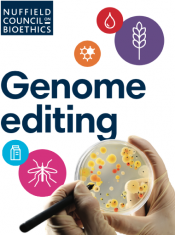Heritable human genome editing: the National Academies/Royal Society report
By Peter Mills,
Nuffield Council on Bioethics
| 09. 08. 2020
The Consensus Study Report of the International Commission on the Clinical Use of Human Germline Genome Editing convened by the US National Academies of Medicine and Sciences and the UK’s Royal Society was published on 3 September.
Heritable human genome editing is a substantial report and stands as a worthy contribution to discussion of heritable human genome editing (HHGE) in the English-speaking world alongside the National Academies’ earlier (and broader) report, Human Genome Editing, science, ethics, and governance (2017) and our own Nuffield Council report, Genome editing and human reproduction: social and ethical issues (2018).
There are many good things about this report. It is clear, thoughtful and detailed. The Commission has bent itself earnestly to fulfilling the task given to it by the commissioning academies. The coverage of the current state of the science, the prospects for the use of HHGE in the clinic, and the presentation of its potential applications manages to be both thorough and readable. It strives constantly to keep its feet on the ground, both through repeated reference to the technical uncertainties that should still...
Related Articles
By Scott Solomon, The MIT Press Reader | 02.12.2026
Chris Mason is a man in a hurry.
“Sometimes walking from the subway to the lab takes too long, so I’ll start running,” he told me over breakfast at a bistro near his home in Brooklyn on a crisp...
By Diaa Hadid and Shweta Desai, NPR | 01.29.2026
MUMBRA, India — The afternoon sun shines on the woman in a commuter-town café, highlighting her almond-shaped eyes and pale skin, a look often sought after by couples who need an egg to have a baby.
"I have good eggs,"...
By George Janes, BioNews | 01.12.2026
A heart attack patient has become the first person to be treated in a clinical trial of an experimental gene therapy, which aims to strengthen blood vessels after coronary bypass surgery.
Coronary artery bypass surgery is performed to treat...
By Staff, ScienceDaily | 01.05.2026
Scientists at UNSW Sydney have developed a new form of CRISPR technology that could make gene therapy safer while also resolving a decades-long debate about how genes are switched off. The research shows that small chemical markers attached to DNA
...




